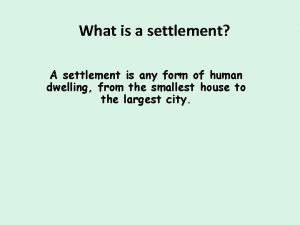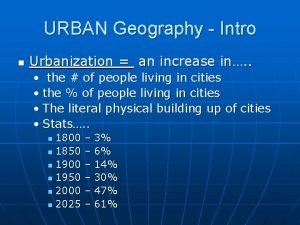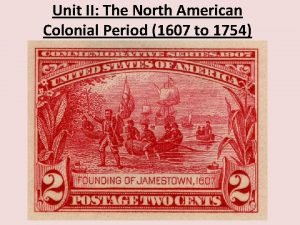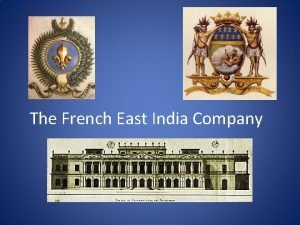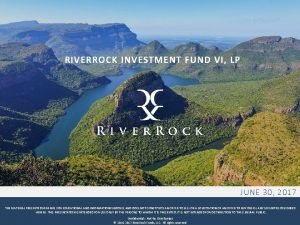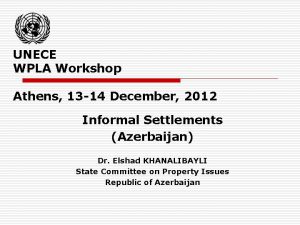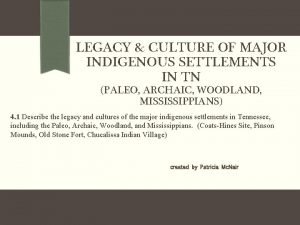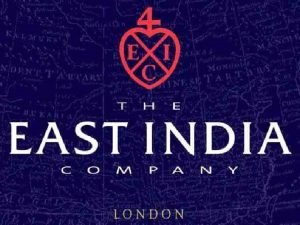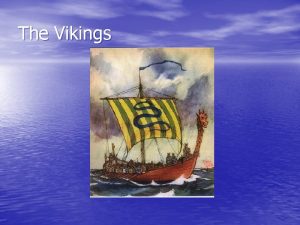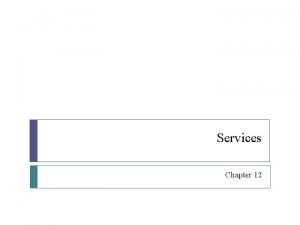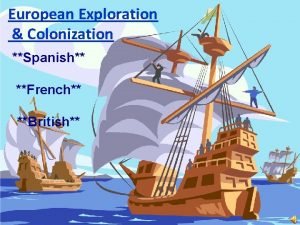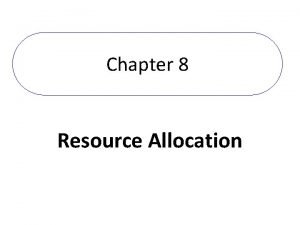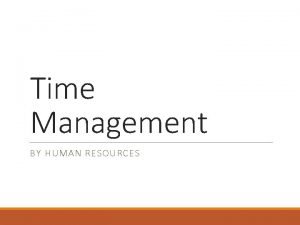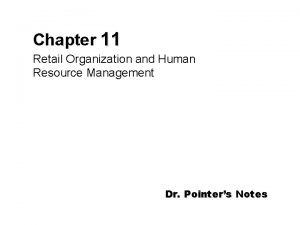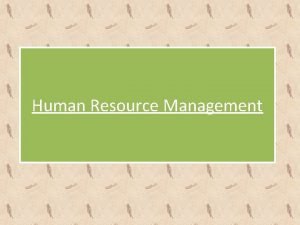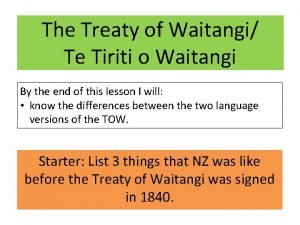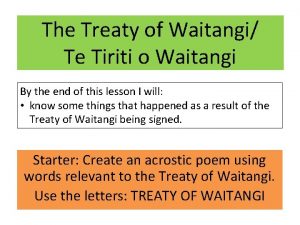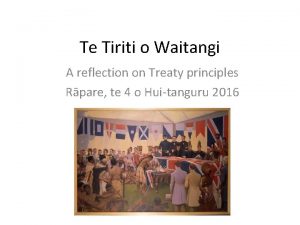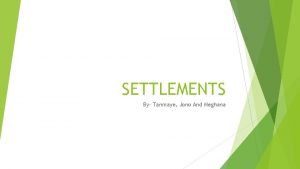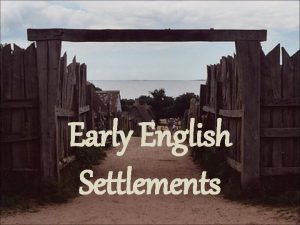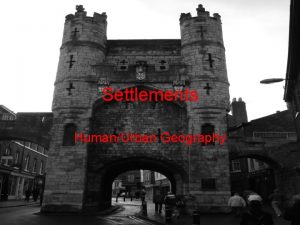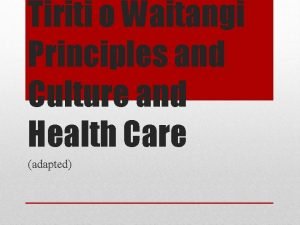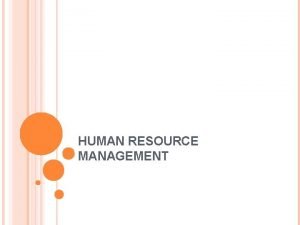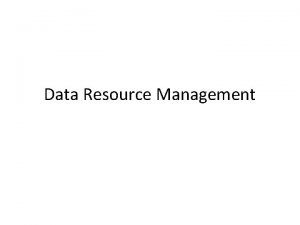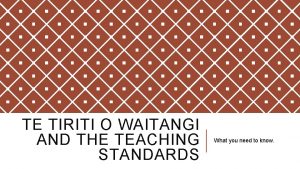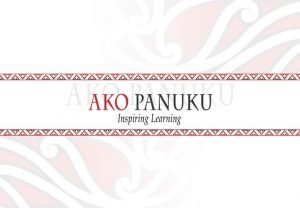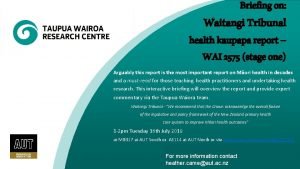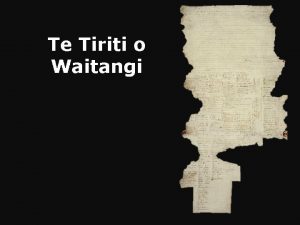Treaty of Waitangi settlements and resource management Structure


















- Slides: 18


Treaty of Waitangi settlements and resource management

Structure • Treaty of Waitangi settlements in Hawke’s Bay • Treaty Principles & what they mean for Regional Governance • Benefit /cost/risk issues • Roles – Crown’s role – Iwi role – Regional Council’s role • Steps from here

Treaty Settlement groupings in Hawke’s Bay • Wairoa – in mandating process • Ruapani/ (Tuhoe? ? ) – mandated • Ngati Pahauwera – – Agreement in principle – Deed of Settlement by December 09 • Ngati Hineuru/ Maungaharuru Tangitu – in mandating process • Ahuriri – mandated • Heretaunga Tamatea – in mandating process

Whose process? • The Crown & Iwi • HBRC can help influence and shape aspects of the settlement that impact on its functions • Public can submit to Maori Affairs Select Committee on specific Treaty legislation

Treaty elements • Economic redress – Redress targeted at legitimate iwi grievances with respect to land confiscation, land transfers etc • Cultural redress – Redress associated with legitimate claims – Customary rights – Partnership in natural resource management and involvement in resource management decision making

Treaty Principles • A partnership, exercised with utmost good faith • An agreement that can be adapted to meet new circumstances • Needs of both Maori and wider community met • Maori interest proactively protected by Crown • Crown legally obliged to recognize tino rangatiratanga • Right of iwi to self-management of their resources

Crown’s Proposal for HB • Joint Regional Plan Committee – equal numbers of elected councilors and Treaty claimant groups – role to develop and review regional plans and policy statement: • • Coast Freshwater Land Air – The committee would prepare the plans or plan changes to point of public notification, after which submission process under RMA is triggered – Committee established under treaty legislation to deal with RMA plan development, but not decision making on resource consents

Implications for regional governance and natural resource management • Iwi seeking self-management of natural resources • Government has previously adopted models which sideline regional government and wider regional community (river boards) • Opportunity for Council to be proactive in its approach and support a workable Crown proposal

Steps to-date & imminent • Chair, CE and others have met with Crown Negotiator to explore options and have met with some but not all claimant groups • Minister of Treaty Settlements has met with Councillors and staff • Minister has written to Council outlining the Crown’s intent to arrive at an enduring solution and outlining timeframes for the Pahauwera settlement • Council formalised its consultation process on Oct 28 • Council to consider its response to Crown proposal on 25 November • Council can influence shape of resource management decision making • Ultimate decision on future structure of resource management decision making with Crown and Treaty claimants

Benefits of Co-governance • Benefits Strategic – Iwi values alignment to sustainable use of natural resources – Increasing iwi wealth, scale and alignment to regional economy and its development • Post Treaty Settlements approx 70% of NZ’s production forest land will be owned by iwi • and estimates of up to 30% of NZ agri-business will have an Iwi dimension) – Influence and (leverage) with Central Govt. in areas including governance & mgt of water – Water remains as a public common – Iwi as partners in the region’s water strategy – Consolidates regional resource management functions vs Govt centralisation agenda

Benefits of Co-governance Benefits Specific to a joint Committee Model – Economically efficient – as opposed to individual River Boards and retains catchment mgt model of regions – Non operational i. e. , not making individual decisions e. g. , consents – No iwi right of veto – Plans plan, changes etc subject to all normal processes of submission appeal including to Environment Court – Served by the current institutional capacity of the Regional Council – Iwi in process as opposed to appealing it

Costs of Co-governance • Decision making by majority consensus - slower? • Capacity of iwi (currently? ? ) • Additional training load for staff • Payments to committee reps • Committee size

Risks of doing • Hawke’s Bay community reaction • Iwi splintering – i. e. , some in some out – all or nothing • Crown (OTS) doesn’t implement cleanly

Risks of not doing • “Solution” imposed and variable from settlement to settlement and may drag out • Crown has talked to some Treaty Claimants – expectations growing • Water strategy opposed by Iwi e. g. , storage/irrigation, plan changes, consents • Minister for Environment’s aspiration to change water governance in NZ – July 2010 Land & Water forum, Water Boards/EPA

Crown and National Led Government role • Treaty Partner • Seeking a solution for Treaty Settlements that is replicable across all settlements • Has set the aspirational goal settling claims by 2014 • Is seeking inclusive solution for Iwi in mainstream society and acknowledges the need to dovetail Iwi partnerships alongside democratic governance • Is politically driven to find “wins’ for its coalition partner who has identified water as one of its top 3 issues • Is seeking to avoid legal risk • Needs to lead the communication through the media but preferably in partnership with Iwi & HBRC

Iwi’s role • Mana Whenua • Are seeking to move beyond “grievance” • Are seeking empowerment • Are driven by both traditional Kaitiaki values but also to lift their peoples prosperity • Have considerable leverage on Crown to settle • Are open to and want partnership with HBRC • Approx 80% of iwi are dependent on the primary sector for their livelihood

HBRC role • Shaping the model so that it is practically workable, deals with risk, protects the community and its interests e. g. property rights • Positively working with claimant groups and crown to achieve the above • Consult with the affected community to ensure if at all possible an acceptable and sustainable solution is developed
 Settlement geography grade 12
Settlement geography grade 12 Site:slidetodoc.com
Site:slidetodoc.com Bid rent theory example
Bid rent theory example English settlements in america
English settlements in america French east india company name
French east india company name River rock life settlements
River rock life settlements Citystate informal settlements
Citystate informal settlements Major indigenous settlements in tennessee
Major indigenous settlements in tennessee Functions of settlements
Functions of settlements East india company flag
East india company flag Map of where vikings travelled
Map of where vikings travelled The basic systems and services of a city
The basic systems and services of a city New exploration
New exploration Why were ancient greek communities isolated from each other
Why were ancient greek communities isolated from each other Resource allocation vs resource leveling
Resource allocation vs resource leveling Perbedaan resource loading dan resource levelling
Perbedaan resource loading dan resource levelling Time management human resources
Time management human resources Assess human resource requirements of a retail organization
Assess human resource requirements of a retail organization Function of personnel management
Function of personnel management

